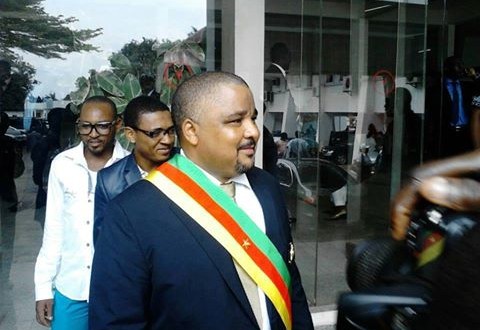Osih’s Coalition Skepticism: A Recipe for Perpetual Biya Rule or a Bold Stand for Substance?
By James Agbor, BaretaNews Editorial
In the sweltering heat of Cameroon’s political arena, where the air is thick with whispers of alliances and the shadows of a regime that has clung to power for over four decades, Joshua Osih’s recent dismissal of opposition coalition talks has ignited a firestorm of debate. As the National Chairman and presidential hopeful of the Social Democratic Front (SDF), Osih has boldly labeled these discussions a cunning “ploy” orchestrated by Paul Biya’s entrenched Cameroon People’s Democratic Movement (CPDM) to sow confusion and divert attention from the real battleground: the manifestos and visions of the candidates themselves. But in Biya’s Cameroon—a land where division has been the regime’s most potent weapon—can a fragmented opposition truly hope to dismantle the iron grip of a nonagenarian autocrat? This question cuts to the heart of our nation’s struggle for genuine change, and it demands unflinching scrutiny.
Osih’s stance, articulated with the poise of a seasoned statesman, is rooted in a deep-seated frustration with the superficiality plaguing opposition politics. He accuses journalists of fixating on the drama of coalitions rather than delving into the substantive policies that could heal our fractured republic. “Defeating Biya does not depend on political alliances,” Osih insists, emphasizing that any union must be forged on shared ideologies and concrete programs, not fleeting anti-regime fervor or personal egos. His vision for Cameroon—a three-year transitional period for constitutional reforms, a push for federalism to address the Anglophone crisis, and economic revitalization—stands as a beacon of programmatic clarity. In a media landscape often manipulated by Yaoundé’s strings, Osih’s call to prioritize manifestos over merger gossip is a refreshing plea for intellectual rigor over theatrical unity.
Yet, herein lies the crux of the critique: How can Osih envision victory through dispersed ranks in a system meticulously designed to exploit opposition fractures? Historical precedents paint a grim picture. The 2018 presidential election, marred by allegations of fraud and voter intimidation, saw opposition votes splintered among figures like Maurice Kamto, Cabral Libii, and Osih himself, allowing Biya to claim an implausible 71% victory. This was no accident; it was the fruit of a divide-and-conquer strategy that has sustained the CPDM’s dominance since 1982. In Biya’s Cameroon, where institutions like Elections Cameroon (ELECAM) serve as extensions of the ruling party, and security forces stifle dissent, a united front is not merely advantageous—it is existential. Without it, opposition efforts are vulnerable to piecemeal suppression: arrests, ballot disqualifications, and the erosion of momentum in conflict-ravaged regions like the Northwest and Southwest.
The Anglophone crisis, now entering its ninth year with over 700,000 displaced and thousands dead, amplifies this urgency. As voices from Ambazonia cry out for self-determination, Osih’s reformist approach—advocating ballots over bullets—risks being drowned out in the cacophony of separatist boycotts and regime-orchestrated violence. BaretaNews has long championed the cause of Anglophone liberation, viewing participation in Yaoundé’s electoral charade as a potential legitimization of colonial overreach. Osih’s skepticism toward hasty coalitions may stem from noble intentions, avoiding alliances that could fracture post-election or be infiltrated by CPDM moles. However, it underestimates the regime’s mastery at turning opposition infighting—witness the recent collapse of talks between Kamto, Libii, and Osih due to ideological clashes—into its own salvation.
Counterarguments to Osih’s position are not without merit. Forced unity, devoid of ideological alignment, could breed resentment and instability, much like fragile coalitions in other African nations that crumbled under the weight of ambition. Osih’s insistence on substance over spectacle rightly exposes how regime ploys distract from pressing issues: rampant corruption, economic stagnation, and the humanitarian catastrophe in the English-speaking regions. Moreover, in a rigged system where even a monolithic opposition might face manipulated results, true victory may lie beyond the ballot box—in international pressure, mass mobilization, and a constitutional reckoning that dismantles Biya’s edifice altogether.
As the October 2025 election looms, Cameroon’s opposition stands at a crossroads. Osih’s call for principled politics is admirable, a poetic defiance against the regime’s machinations. Yet, in the harsh reality of Biya’s Cameroon, dispersion is not strategy; it is surrender. For the SDF and its peers to transcend mere survival, they must blend Osih’s emphasis on manifestos with selective, ideology-driven alliances. Only then can the opposition forge a symphony of resistance capable of silencing the CPDM’s discordant reign. The people of Cameroon—Anglophones and Francophones alike—deserve no less than a united chorus for freedom, not echoes of division that perpetuate the status quo.
Let this be a clarion call: Substance without solidarity is a dream deferred. In the fight for our nation’s soul, we must choose wisely, or risk another chapter in Biya’s endless saga.




